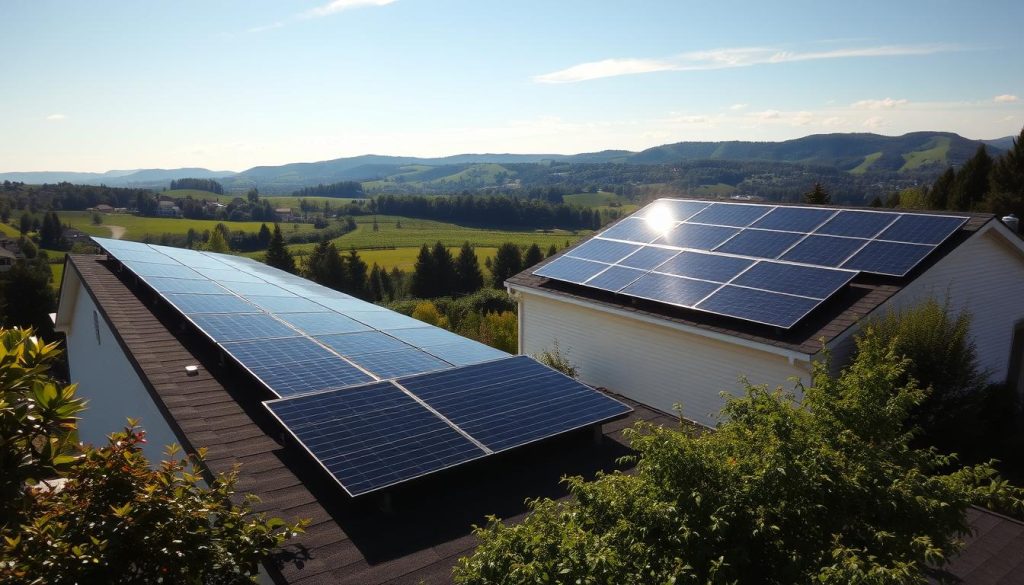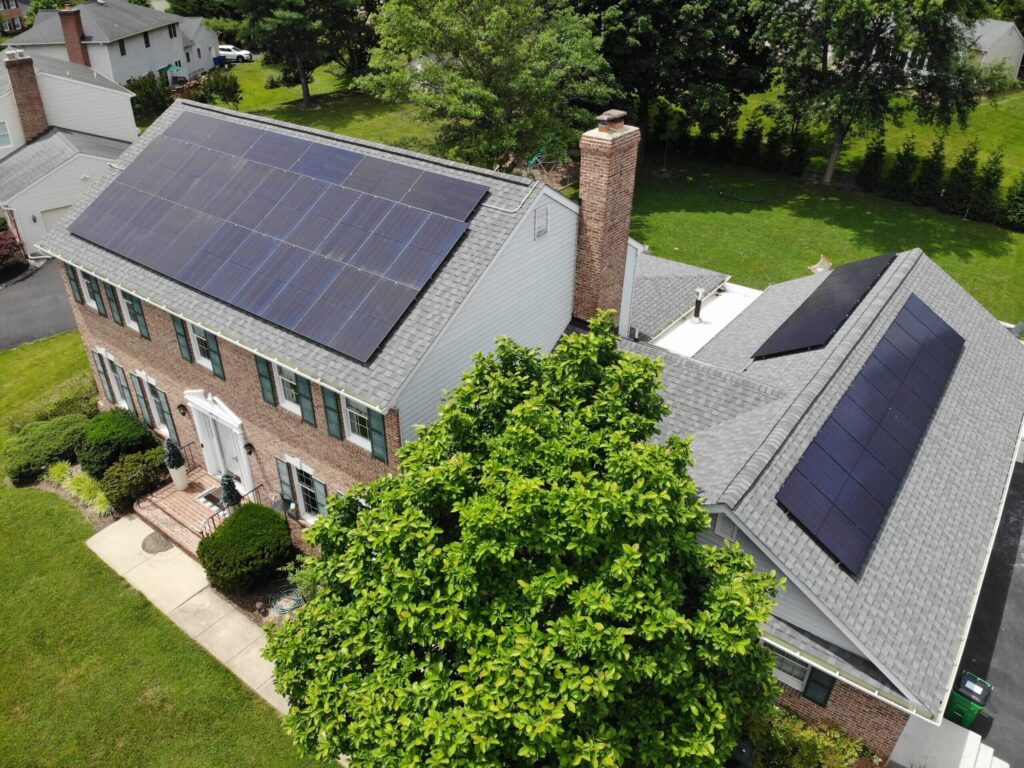Solar Panel Solutions in Pennsylvania
Do you ever feel overwhelmed by mounting electricity bills or concerned about the impact your home has on the environment?
Contact Lumina Solar PA about Solar Panels Pennsylvania
More homeowners in the state are turning to renewable energy to reduce their electricity bills and environmental impact. With state and federal incentives, switching to clean energy has never been more accessible. Pennsylvania’s sunny days and supportive policies make it an ideal place for this transition.

Installing a solar energy system at home can lead to significant savings over time. The cost of these systems has dropped in recent years, making them a smart investment. Plus, with programs like net metering, you can even earn credits for excess power sent back to the grid.
If you’re considering this option, this guide will walk you through the benefits, installation process, and financial opportunities. Pennsylvania’s renewable energy market is growing, and now is the perfect time to join the movement.
Understanding Solar Energy in Pennsylvania
Harnessing the power of the sun is becoming a popular choice for many in the state. Solar energy works by converting sunlight into electricity using solar panels. These panels capture photons from the sun and turn them into usable power for your home.
Despite having fewer sunny days compared to other states, Pennsylvania is making strides in solar capacity. The state ranks 22nd nationally and has seen significant growth in recent years. This progress is driven by supportive policies and increasing awareness of renewable energy benefits.

Federal and state incentives make investing in solar systems more affordable. The federal tax credit offers a 30% reduction on installation costs. Additionally, programs like net metering allow you to earn credits for excess energy sent back to the grid.
Technical aspects, such as the ideal tilt for panels, play a role in maximizing efficiency. Panels facing south produce the most energy, while those facing north may see a 30% drop. Proper installation ensures you get the most out of your system.
Pennsylvania’s solar landscape is evolving rapidly. With increasing capacity and supportive programs, now is a great time to explore this clean energy option. The state’s commitment to renewable energy ensures a bright future for solar adoption.
Benefits of Solar Energy for Your Home
Switching to clean energy is a smart move for homeowners looking to save money and protect the environment. One of the biggest advantages is the reduction in monthly electricity bills. By generating your own power, you can significantly cut down on utility costs.
Another key benefit is energy independence. With a solar panel system, you rely less on traditional power sources. This not only saves you money but also protects you from rising energy prices.
Maintenance is minimal with these systems. Once installed, they require little upkeep, making them a hassle-free option. Pair this with the 30% federal tax credit, and the long-term savings become even more appealing.
Your home’s value can also increase. Studies show that properties with solar panels sell faster and at higher prices. Buyers are drawn to the idea of lower energy costs and a smaller carbon footprint.
Even in colder climates, these systems perform efficiently. Modern technology ensures they work well in various conditions, making them a reliable choice for Pennsylvania homes.
Investing in a solar energy system is not just about savings. It’s a step toward a cleaner, more sustainable future for your household and the planet.
Solar Panels Pennsylvania: Installation and Savings
Investing in a clean energy system is a practical step toward long-term savings and sustainability. The installation process is straightforward but requires attention to detail to ensure optimal performance. A certified installer will assess your roof’s condition, orientation, and tilt to maximize energy production.
Proper setup is crucial for achieving the best results. Panels facing south at a tilt between 15 and 40 degrees generate the most power. This ensures your system operates efficiently, even in colder temperatures. A well-installed system can reduce your monthly utility bills by 20-30% or more.
The initial investment may seem high, but federal and state incentives make it more affordable. The 30% tax credit significantly lowers the upfront cost. Over time, the savings on your electricity bills can help the system pay for itself in as little as six to ten years.
Choosing a reputable solar company is key to a successful project. Certified installers ensure your system meets all technical requirements and operates at peak efficiency. This not only maximizes your savings but also extends the lifespan of your panels.
By generating your own power, you gain energy independence and protect yourself from rising utility rates. Excess energy can be sold back to the grid through net metering, further reducing your costs. This makes going solar a smart financial decision for your home.
With the right setup and professional installation, your clean energy system becomes a reliable source of power and savings. Take the first step today and explore how this investment can benefit your household and the environment.
Navigating Financial Incentives and Payment Options
Understanding your financial options is key to making the most of your clean energy investment. With federal and state incentives, the upfront cost of installing a system can be significantly reduced. The federal tax credit offers a 30% reduction, making it easier to transition to renewable power.
Pennsylvania also provides additional programs to support your investment. These include alternative energy credits and net metering, which allow you to earn credits for excess electricity sent back to the grid. These incentives make the switch more affordable and rewarding.
When it comes to financing, you have several choices. A cash purchase offers the most savings over time, while solar loans and home equity financing provide flexibility. Leasing and power purchase agreements are also available, though they may limit your access to tax credits.
Careful planning is essential to maximize your benefits. Compare multiple quotes from reputable companies to find the best terms. This ensures you get the most value from your investment while staying within your budget.
By taking advantage of these financial options, you can reduce your utility bills and enjoy long-term savings. Make an informed decision today and start reaping the rewards of clean energy.
Assessing Your Home’s Suitability for Solar Power
Evaluating your home’s potential for clean energy is a crucial first step toward reducing your carbon footprint. Before investing in a solar panel system, it’s important to determine if your property is a good fit. Factors like roof condition, angle, and location play a key role in maximizing efficiency.
Start by examining your roof. A pitch between 15 and 40 degrees is ideal for capturing sunlight. South-facing roofs generate the most energy, while north-facing ones may see a drop in output. Ensure your roof is structurally sound and can support the weight of the panels. Minor repairs might be necessary before installation.
Your location in the state also matters. Even with colder winters, Pennsylvania’s average of 4-4.5 daily sunshine hours makes it a viable option. Modern panels are designed to perform well in various climates, ensuring consistent power generation year-round.
Consider your energy consumption patterns. Homes with higher electricity usage benefit the most from a solar system. Proper orientation and unobstructed access to sunlight are essential for optimal performance. Use tools like Google’s Project Sunroof to estimate your property’s potential.
Here’s a quick checklist to assess your home’s suitability:
– Roof condition and angle: Is it in good shape and properly oriented?
– Energy usage: Does your household consume enough to justify the investment?
– Location: Does your property receive adequate sunlight throughout the year?
– Structural integrity: Can your roof support the panels?
By carefully evaluating these factors, you can determine if your home is ready for clean energy. Taking these steps ensures a smooth transition and maximizes your long-term savings and environmental impact.
Understanding Solar Policy and Grid Integration in Pennsylvania
Pennsylvania’s solar policies and grid integration play a crucial role in shaping the future of clean energy adoption. The state’s commitment to renewable power is evident through its supportive regulations and incentives. Understanding these policies can help you make informed decisions about your solar panel investment.
One of the most significant policies is net metering. This program allows you to sell excess electricity back to the grid at full retail rates. It’s a win-win situation: you reduce your utility bills while contributing to the state’s clean energy goals. The Pennsylvania Public Utility Commission oversees these regulations, ensuring fair treatment for all participants.
Grid integration is another critical aspect. Modern systems are designed to seamlessly connect with the existing power infrastructure. This ensures a stable and reliable energy supply, even during peak demand. The state’s grid operator, PJM Interconnect, plays a vital role in managing this process.
Current legislation is also shaping the future of solar adoption. Policies like the Alternative Energy Portfolio Standard (AEPS) encourage utilities to source a portion of their power from renewable sources. These initiatives not only benefit homeowners but also drive the state toward a more sustainable future.
By understanding these policies, you can maximize the benefits of your solar panel system. From net metering to grid integration, Pennsylvania offers a supportive environment for clean energy adoption. Take advantage of these opportunities to reduce your carbon footprint and save on energy costs.
Selecting a Trusted Solar Installer
Choosing the right installer is crucial for a successful solar panel system. A reliable company ensures your project runs smoothly and delivers the expected savings. Start by checking their experience and certifications. Look for installers with at least five years in the business and proper licensing.
Local reputation matters too. Read reviews and ask for references to gauge their reliability. A company with positive feedback and a strong track record is more likely to meet your expectations. Avoid those with frequent complaints or unresolved issues.
In-house installers are often a better option than subcontractors. They ensure consistent quality and accountability throughout the process. Ask if the company uses its own team for installations. This can make a big difference in the final outcome.
When interviewing potential providers, ask about warranties, timelines, and their experience with similar projects. Clear communication and a transparent process are key to a successful installation. A trustworthy installer will answer your questions confidently and provide detailed information.
By taking these steps, you can find a reliable partner for your solar panel project. This ensures your system is installed correctly and delivers the maximum energy and savings for your home.
Maximizing Your Solar Investment for Long-Term Savings
To get the most out of your clean energy setup, focus on strategies that enhance both financial and energy efficiency returns over time. A well-maintained solar panel system can deliver significant benefits for decades, but it requires careful planning and attention.
Start by monitoring your system’s performance regularly. Use tools like smart inverters or apps to track energy production. This helps identify any issues early, ensuring your panel setup operates at peak efficiency. Periodic maintenance, such as cleaning and inspections, also extends its lifespan.
Leverage net metering to maximize your savings. By sending excess energy back to the grid, you earn credits that reduce your utility bills. Pair this with a storage option like a battery backup to store power for nighttime or outages. This ensures you get the most value from your investment.
Consider future upgrades to keep your system efficient. As technology advances, adding newer panels or expanding your setup can boost output. This proactive approach ensures your savings grow over time.
Finally, explore all available incentives. Programs like SRECs provide additional income for the power you generate. By combining these strategies, you can maximize your returns and enjoy the long-term benefits of clean energy.
Conclusion
Making the switch to renewable power is a decision that pays off in more ways than one. From reducing your monthly bills to increasing your home’s value, the benefits are clear. Proper installation and choosing the right solar panel system ensure you maximize your energy production and long-term savings.
Assessing your home’s suitability and working with a trusted installer are critical steps. Programs like net metering and federal tax credits make the transition more affordable. These incentives, combined with minimal maintenance, make renewable energy a smart investment for your future.
Lumina Solar PA is here to guide you every step of the way. With expert advice and professional installation, your path to clean energy is smooth and rewarding. Take the next step today and start enjoying the benefits of a sustainable, cost-effective system for your home.




